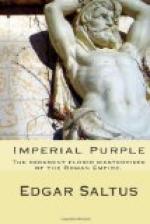At that time Faustine must have been at least twenty-eight, possibly thirty. There were matrons who had not seen their fifteenth year, and Faustine had been married young. Her daughter, Lucille, was nubile. Presently Verus, or rather his lieutenants, succeeded, and the girl was betrothed to him. There was a festival, of course, games in abundance, and plenty of blood.
It would have been interesting to have seen her that day, the iron ring of betrothal on her finger, her brother, Commodus, staring at the arrangement of her hair, her mother prettily perplexed, her father signing orders which messengers brought and despatched while the sand took on a deeper red, and Rome shrieked its delight. Yes, it would have been interesting and typical of the hour. Her hair in the ten tresses which were symbolic of a fiancee’s innocence, must have amused that brute of a brother of hers, and the iron ring on the fourth finger of her left hand must have given Faustine food for thought; the vestals, in their immaculate robes, must have gazed at her in curious, sisterly ways, and because of her fresh beauty surely there were undertones of applause. Should her father disappear she would make a gracious imperatrix indeed.
But, meanwhile, there was Faustine, and at sight of her legends of old imperial days returned. She was not Messalina yet, but in the stables there were jockeys whose sudden wealth surprised no one; in the arenas there were gladiators that fought, not for liberty, nor for death, but for the caresses of her eyes; in the side-scenes there were mimes who spoke of her; there were senators who boasted in their cups, and in the theatre Rome laughed colossally at the catchword of her amours.
Marcus Aurelius then was occupied with affairs of state. In similar circumstances so was Claud—Messalina’s husband—so, too, was Antonin. But Claud was an imbecile, Antonin a man of the world, while Marcus Aurelius was a philosopher. When fate links a woman to any one of these varieties of the husband, she is blessed indeed. Faustine was particularly favored.
The stately prince was not alone a philosopher—a calling, by the way, which was common enough then, and has become commoner since— he was a philosopher who believed in philosophy, a rarity then as now. The exact trend of his thought is difficult to define. His note-book is filled with hesitations; materialism had its allurements, so also had pantheism; the advantages of the Pyrrhonic suspension of judgment were clear to him too; according to the frame of mind in which he wrote, you might fancy him an agnostic, again an akosmist, sometimes both, but always the ethical result is the same.
“Revenge yourself on your enemy by not resembling him. Forgive; forgive always; die forgiving. Be indulgent to the wrong-doer; be compassionate to him; tell him how he should act; speak to him without anger, without sarcasm; speak to him affectionately. Besides, what do you know of his wrong-doing? Are all his thoughts familiar to you? May there not be something that justifies him? And you, are you entirely free from reproach? Have you never done wrong? And if not, was it fear that restrained you? Was it pride, or what?”




